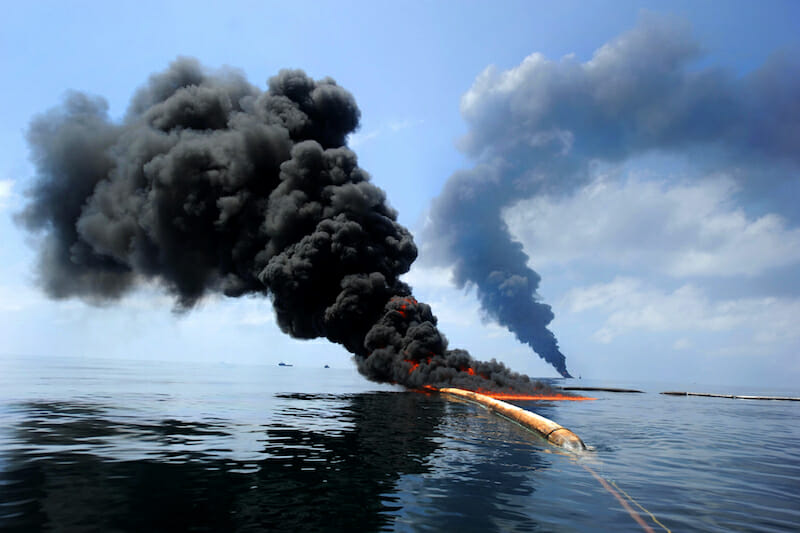CNN Perpetuates Destructive Climate Change Myth
Though it might be comforting, it’s just not true that individual lifestyle changes will save the planet from companies like ExxonMobil and BP. The 2010 BP oil spill in the Gulf of Mexico is just one example of how major corporations are killing the planet. (Petty Officer 2nd Class Justin Stumberg)
The 2010 BP oil spill in the Gulf of Mexico is just one example of how major corporations are killing the planet. (Petty Officer 2nd Class Justin Stumberg)
CNN drew the ire of environmentalists Tuesday by focusing its discussion of climate change on what individuals can do—without addressing the influence of corporations’ greenhouse gas emissions.
Scared by that new report on climate change? Here’s what you can do to help:
• Eat less meat (about 30%)
• Swap your car or plane ride for a bus or train
• Use a smart thermostat in your home, and upgrade to more efficient appliances
More: https://t.co/m6JnG7mUsx pic.twitter.com/82rssjms0i
— CNN (@CNN) Oct. 9, 2018
Solutions such as vegetarianism, public transit and smart home appliances ultimately pale in comparison to the harm caused by fossil fuels. The cable news outlet borrowed its suggestions from a report published Monday by the U.N.’s Intergovernmental Panel on Climate Change. The report found the planet to be at risk of extreme drought, wildfires, floods and food shortages by 2030, and it listed a number of ways in which individuals could reduce their carbon footprint. But solving our climate crisis isn’t quite so simple.
reminder that 100 corporations are responsible for 71% of global greenhouse gas emissions and presenting the crisis as a moral failing on the part of individuals without noting this fact is journalistic malpractice. https://t.co/hzQ6o9yS7v
— Adam H. Johnson (@adamjohnsonNYC) October 9, 2018
Scared by that new report on climate change? Here’s what you can do to help:
• Seize the state
• Bring the fossil fuel industry under public ownership, rapidly scale down production
• Fund a massive jobs program to decarbonize every sector of the economy https://t.co/ZZ7lmunfVW
— Kate Scare-onoff (@KateAronoff) October 9, 2018
I don’t eat meat. I don’t drive. I live in a 400 sqft apartment in a dense city. I don’t run the a/c all day I compost/recycle I volunteer with habitat restoration. I do these things and still know it’s not enough. We have to kill fossil fuel and build a whole new system. https://t.co/0LPWM5iS3U
— kate wagner ?️✨ (@mcmansionhell) October 9, 2018
It may feel helpful, even soothing, to think small cultural changes could make a huge difference. A study published last year found that since 1988, 100 companies are responsible for more than 70 percent of global greenhouse gas emissions. The highest-emitting corporations included ExxonMobil, Shell, BP and Chevron. Collectively, these four companies are responsible for 6.49 percent of the world’s greenhouse gas emissions.
The U.N. report suggests reducing the amount of meat we eat. A vegetarian diet does create a reduced carbon footprint, but on the other hand, fruits and vegetables are more likely than meat to be wasted. Although the livestock industry is responsible for a large portion of greenhouse gas emissions, even vegan foods, such as rice, can have a large carbon footprint.
The report also recommends making homes more environmentally friendly. As I’ve written before, changes such as installing solar panels and smart-home thermometers can have a positive impact, but are prohibitively expensive for many people. Meanwhile, low-income communities are experiencing the consequences of climate change every day through pollution in the air and water, and are ever more vulnerable to extreme weather events.
Individual action appears to be tethered to an imagined reality. Take, for example, the growing movement to address ocean pollution by banning plastic straws.
“The fixation is weird,” writes David M. Perry in Pacific Standard, adding that it shames disabled people, for whom plastic straws are a huge help:
There’s nothing wrong with pushing people to be more environmentally conscious. But individual action is not going to save our oceans. Our industrial systems continue to flood waste facilities with plastics, big and small. From there, plastics flow into rivers and streams and are carried into the sea. We need to look at the systems that generate these plastics, and hold producers financially responsible for safe disposal. Let’s put our efforts where the money is, rather than shaming disabled consumers who just want an accessible drink of water.
The reality is that fossil fuels are destroying our planet, and no amount of solar panels and lifestyle changes will save it if major culprits are not held accountable.
Your support matters…Independent journalism is under threat and overshadowed by heavily funded mainstream media.
You can help level the playing field. Become a member.
Your tax-deductible contribution keeps us digging beneath the headlines to give you thought-provoking, investigative reporting and analysis that unearths what's really happening- without compromise.
Give today to support our courageous, independent journalists.






You need to be a supporter to comment.
There are currently no responses to this article.
Be the first to respond.